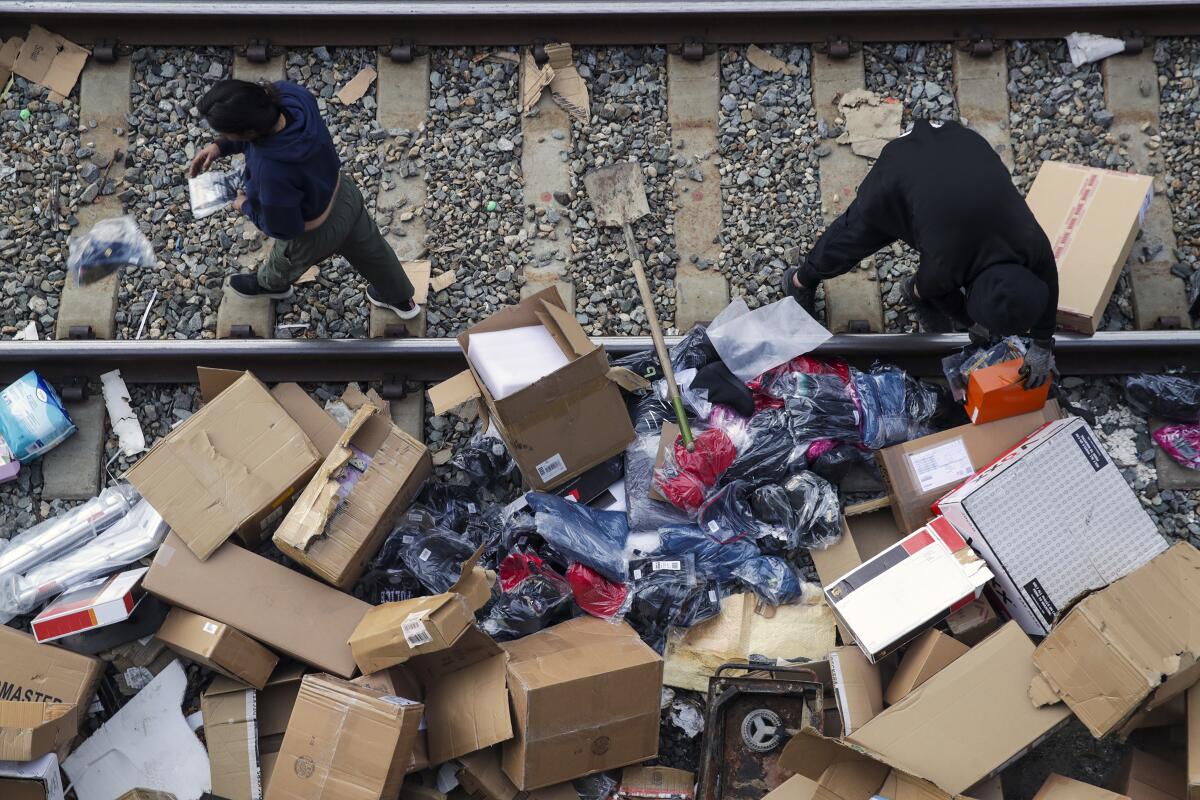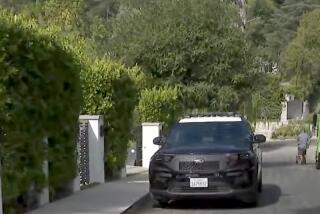Scores of guns stolen from trains cause more problems in L.A.

In August, Los Angeles police officers arrested two people in Lincoln Heights carrying a pair of shiny new .22-caliber handguns.
The guns were clean, as though they came right off the shelf — not at all like the ones typically found following arrests. Just days later, officers patrolling in neighboring Northeast L.A. arrested a person with a similar handgun, in the same pristine condition.
A trace of the weapons revealed they came from a batch of 36 handguns reported missing as they were being shipped by train to Tennessee, Los Angeles Police Department officials said.
One of the suspects arrested revealed that he had bought the weapons on the street — and that they had come from cargo trains in the nearby Lincoln Heights rail yards. He casually mentioned that he could not afford the price of a shotgun being offered for sale, police investigators said. Shortly afterward, LAPD and the Bureau of Alcohol, Tobacco, Firearms and Explosives arrested two other suspects with two of those shotguns and later learned they were part of a missing shipment of 46 shotguns.
The thefts of the weapons offer a sobering peek into the vulnerability of rail networks that are part of the supply routes that help deliver an untold number of guns to stores and consumers every year. Law enforcement sources told the Los Angeles Times they are investigating whether an argument over the stolen weaponry led to the killing of one man.
“I’ve got 24 years in LAPD, ex-military, secret clearance and I have to wait 10 days to get a new firearm and these guys are going into these containers with no locks and getting guns,” said Capt. German Hurtado, who oversees the LAPD’s Hollenbeck Division, where the rail yards are located. “These guns were unguarded, unprotected... God knows how many guns have been stolen that way.”
Only a handful of the 82 guns known to have been stolen from trains passing through the Eastside neighborhood have been recovered. Investigators are not yet sure how many other weapons may have been pilfered, Hurtado said.
A gang in L.A.’s Eastside orchestrated the thefts, according to LAPD detectives. Feuding over who would profit from the stolen weaponry taken from the Union Pacific train yards appears to have been behind the killing of a person involved in the thefts, according to multiple law enforcement sources who were not authorized to speak publicly.
The realization that so many guns had been taken from trains — and the possibility that many more may have been stolen too — was chilling, Hurtado said.
“This is bigger than we thought. They aren’t just stealing shoes and stuff. This is an organized crime to the level they are stealing guns,” he said.
The cargo theft gained national attention earlier this month as images of the debris left on the Union Pacific tracks by thieves went viral. Union Pacific said it runs about 275 miles of tracks in Los Angeles County; since December 2020, an average of 90 containers a day have been burglarized. Most of those have occurred in two rail yards, including Lincoln Heights.
Union Pacific, which has police powers along the tracks, and law enforcement officials have squabbled about who is to blame for the cargo thefts. Police and former employees say Union Pacific has downsized its security forces in recent years amid wider cutbacks, leaving freight vulnerable. The company said it has deployed additional agents to Los Angeles County but has refused to specify how many officers are typically assigned to the area.
“We need strict accountability measures to stop these thefts, and we need them now,” said Councilman Kevin de León, who represents the area. “The families I represent have enough to worry about with gang violence, air pollution, and a high cost of living; they shouldn’t have to worry about dangerous firearms flowing from federal railways into their neighborhoods.”
No mention of the stolen guns was made last week when Gov. Gavin Newsom led a cleanup of the rail yards amid a large audience of reporters and other onlookers.
The theft of the weapons from the trains was largely kept under wraps until this week, when LAPD Chief Michel Moore informed the civilian Police Commission. Gun thefts from train cars have become a national issue.
LAPD homicide detectives are investigating whether the predawn death of Leopoldo “Boxer” Esquivel on Aug. 16 at Valley Boulevard and Block Place was tied to a batch of stolen guns.
A friend took the 34-year-old, who had two gunshot wounds to his head and body, to Los Angeles County-USC Medical Center, where he died.
Two law enforcement sources say Esquivel was a member of the Metro 13 gang and that he was fatally shot after a disagreement over the stolen weapons. Esquivel had “Metro” tattooed across his chest and “Metro Boys” tattooed on the back of his left hand, autopsy records show.
Hurtado said detectives found a witness who heard the shooting, but there was no physical evidence and later a tag of “RIP Boxer” appeared on the wall nearby. He said homicide detectives are investigating whether the killing was connected to the guns but have not substantiated it.
Esquivel was convicted of carrying a loaded firearm during an arrest on Dec. 20, 2019, and got 16 months in jail, and a year later was arrested on suspicion of felony possession of a gun, a criminal case that was pending at the time of his killing.
In the wake of the shooting, the Mexican Mafia prison gang, which wields influence over many gangs, sought to prevent an escalation of violence over the guns, accusing rivals of not sharing the bounty, according to two law enforcement sources not authorized to discuss the probe.
It’s unclear how much weaponry comes through L.A.’s rail yards, including the well-traveled Lincoln Heights one. Federal and LAPD investigators say intelligence gathered on the street suggests that ammunition may also be among the stolen loot.
Union Pacific declined Friday night to comment on the stolen weapons, citing “an active criminal investigation.”
“We can tell you that, like all railroads, we carry a variety of goods and commodities, and we work closely with our customers, state and federal regulators and others to ensure the safety and security of all the commodities that we transport,” a spokesperson said in an email to The Times. “We need the support of our law enforcement partners, especially their expertise and investigative skills in addressing the rise of organized criminals targeting our trains in L.A.”
Federal firearms licensees are required by law to report the theft or loss of firearms in transit. The federal government instituted new rules in 2016 after data showed that from fiscal years 2010 through 2014, law enforcement recovered more than 6,600 guns that were traced back to dealers who claimed to have never received their delivery but did not report the theft or loss to federal authorities.
But those rules don’t require the shipping companies transporting guns to report theft or loss.
Ginger Colbrun, a spokeswoman for the ATF in Los Angeles, said the bureau could not comment on the ongoing investigation but added that the agency is assisting the LAPD.
Since August, the LAPD has been involved in 128 arrests related to thefts at the rail yards, but only a handful of those detained have been prosecuted, according to Hurtado.
In a letter to Union Pacific last year, Los Angeles County Dist. Atty. George Gascón said the rail company had presented 47 cases for filing consideration and more than half were filed by his office.
The day after Newsom showed up to help bag debris and decry the thefts, the LAPD arrested six more people who had been under surveillance for crimes related to the train break-ins.
This week, security cameras were added near the Lincoln Heights rail track. But it hasn’t stopped the thefts, said Robert Vega, a Lincoln Heights resident who lives near the tracks.
“You can tell there is still activity,” he said. “I see some of the containers are still driving by open.”
More to Read
Sign up for Essential California
The most important California stories and recommendations in your inbox every morning.
You may occasionally receive promotional content from the Los Angeles Times.












